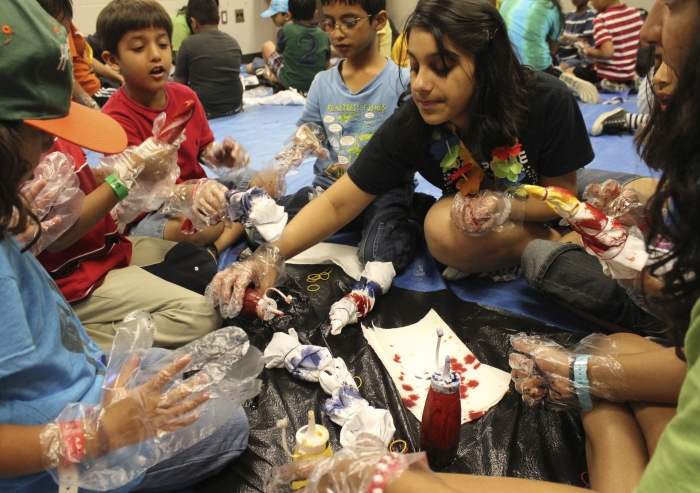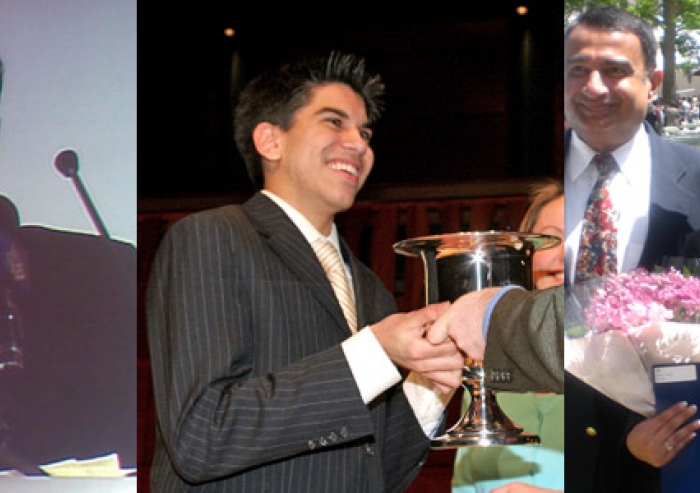“I didn't know what I was looking for,” says Sahar Basaria, a junior from South Florida, frustrated in her search for the perfect college or university to continue her education. “I was both uninformed and overwhelmed.”
When her mother suggested looking into the National College Expedition (NCE) programme, Basaria was relieved. She found the help and confidence she needed to make a sound decision for her future. “Without NCE I'd still be all over the place not really knowing what I was doing,” says Basaria.
A journey of a lifetime
 High School students and their mentors who take part in the National College Expedition get to visit some of the world's best schools in Boston. Shawn Bhimani
High School students and their mentors who take part in the National College Expedition get to visit some of the world's best schools in Boston. Shawn BhimaniOrganised by Aga Khan Education Board (AKEB) USA, the National College Expedition is an annual three-day programme for high-achieving high school students in the United States, Canada and France, empowering them to select the best colleges or universities in their areas of interest. Students get to visit some of the world's best schools in Boston – such as Harvard and MIT – familiarise themselves with the US college application process, and learn how to make an informed decision about selecting a college.
Deciding where to obtain higher education is one of the most strategic choices a student can make in his or her life. Shawn Bhimani, the National Program Manager for NCE, feels that students should take the time to think both critically and analytically about all the benefits a college has to offer and select the one that best meets their aspirations.
“Success in college is a major stepping stone toward a career, personal fulfillment, as well as the ability to give back to those who follow in your footsteps,” says Bhimani.
Professor Arif Babul, a national member of the Aga Khan Education Board for Canada responsible for the secondary and post-secondary sector, facilitates the participation of Canadian students in the USA-organised trip to Boston. He has seen the benefits of the programme firsthand.
“The NCE team, led by Shawn Bhimani for the second year running, has been outstanding both in terms of organising and managing the excursion in a flawless fashion, but also in the collaboration that they have extended to AKEB Canada and myself,” says Professor Babul.
Challenges for Canadian students
One of the key objectives of AKEB in Canada is to encourage eligible Canadian students to apply to the very best schools in the world, including American colleges, such as Princeton, Harvard, Yale, Brown, MIT, Stanford, and Caltech.
But Canadian students face barriers. Unlike their US counterparts, they aren't encouraged to think about universities until the end of grade 11, and completing SATs and portfolios is not typically part of the Canadian university application process.
“Very few students – even among our very best and brightest – recognise that the US college application process is complex and requires focused attention as early as in grade 10,” says Professor Babul.
Another issue that deters many Canadian students from applying to American schools is the high cost. But most are also not aware of financial aid programmes available at many of the Ivy-League US schools.
Mentorship programmes
A key feature of NCE is the mentorship programme, where a group of seasoned students who have been through the rigorous college selection and application process offer their time and expertise to those just getting their feet wet. “The mentor-mentee relationship enables students to build connections, ask tough questions, and find the answers that they always wondered about,” says Bhimani.
During the expedition, days begin early with campus tours and academic advising, and end late at night with mentor-mentee discussions and one-on-one feedback. The rigorous schedule helps students to understand the discipline of college life, while instilling critical coordination and management skills.
In the evening, students and mentors not only discuss the day's events but students also participate in planned knowledge sessions, where they learn about the various facets of the college application process such as securing financial aid, selecting and applying to colleges, putting together resumes, and getting letters of recommendation.
 The NCE programme encourages eligible students to apply to the very best schools in the world, including Princeton, Harvard (pictured above), Yale, Brown, MIT, Stanford, and Caltech. Courtesy of Wikimedia Commons
The NCE programme encourages eligible students to apply to the very best schools in the world, including Princeton, Harvard (pictured above), Yale, Brown, MIT, Stanford, and Caltech. Courtesy of Wikimedia CommonsAnd the mentorship continues well past the few days of the expedition. “The university students that the NCE recruited in Boston area, including the various student mentors who chaperoned the youths, are remarkable in terms of making themselves available to answer questions – both in the short and the long run – and also offering to assist in guiding students through the admissions process,” says Professor Babul.
To better prepare the Canadian students to expand their options, AKEB Canada recently launched the Top US Undergraduate Institutions Mentorship Program under the guidance and expertise of Zaylin Lalji.
“The programme offers top performing students in grades 10 through 12 an opportunity to gain insight into how to put their best foot forward in the application process through first-hand experience,” says Lalji. “Successful programme applicants are matched with alumni and current students from top US universities. As part of this programme, students have someone knowledgeable to turn to as a big brother or sister who can help them through critical steps of the university application process alongside the important role played by parents.”
Lalji attributes the success of their pilot project to the “highly talented programme management team and mentors who are motivated by the desire to make a meaningful difference in the lives of excellent students.”
Empowered youth gearing up
Naveen Kanji, a junior from Chicago, felt that it was the inclusive atmosphere of NCE that inspired her to work harder toward her goals. Kanji's mentors had gone through the same process and succeeded. “People from MIT and Harvard had so many tips,” she says. “Even if I don't end up going to any of those schools, I now know what it takes to have a great application and a good essay.”
Kanji suggests starting the college search early since deciding the best place requires both time and patience. She advises students to meet with admissions counsellors of the schools they are interested in and learn more about their programmes.
Azim Panjwani, a Board Member for AKEB USA, likens the quest for finding the right university to finding a perfect home. Panjwani further cautions that the decision to pick a certain school should not be made hastily; rather it needs to be evaluated over a period of time. “During your high school years take the time to ask the important questions and visit enough colleges to feel satisfied that you've made the best decision for your future,” he suggests.
Aliya-Nur Babul, an NCE participant from Vancouver advises students to start strengthening their resumes early on: “I would suggest that they start volunteering in an area in which they are passionate in grade 8 so that by the time they are in grade 10 or 11 they are leading projects and spearheading new initiatives.”
Professor Babul too points out that often students are under the impression that having perfect scores would automatically get them into good schools. “Good score is only one of several deciding factors,” he states, “others being non-academic involvements like leadership, community service, effort made to find out about preferred direction, initiative exhibited by [the] student, etc.”
Informed parents
But knowing what to look for can often be tricky. Parents, too, confess that they are sometimes overwhelmed by the complexity of the process as well as the sheer amount of information available. In many ways they feel that NCE has simplified the process both for them and their children.
Hanif Nanji from Toronto, whose son Keean attended the expedition recently was full of praise for the programme. “My son's NCE experience was nothing short of simply amazing,” says Nanji. “He truly enjoyed the mentorship that was provided and has come back with a much better insight of the journey that lies ahead.”
“The National College Expedition is a life changing experience in which you gain a better understanding of yourself, “ says 2012 NCE participant Saara Sayani. “[It] will open your eyes to the real world and guide you through your goals.”
Bhimani notes that the main goal of NCE is not to get every student into an Ivy League school. “The intent is to inspire students to reach higher and find the best school that is the right fit for them,” he says.







